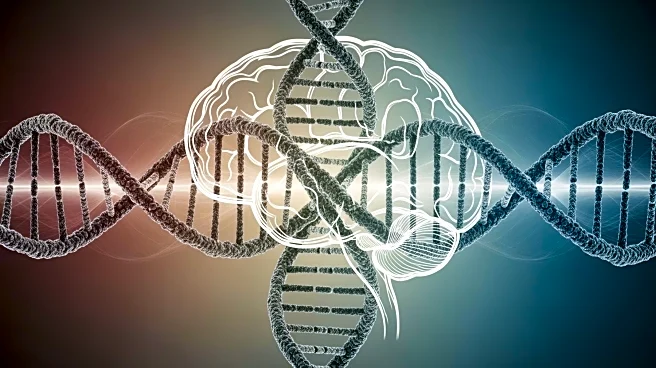What's Happening?
Recent research has identified a connection between heterozygous loss of the SRRM1 gene and various neurodevelopmental disorders. The study, published in Nature, highlights the role of SRRM1 in cell growth
and neurite morphology, suggesting that mutations in this gene may lead to significant developmental delays and intellectual disabilities. The research involved detailed phenotypic analysis of individuals with SRRM1 variants, revealing symptoms such as growth retardation, facial dysmorphisms, and psychomotor developmental delays. Additionally, cellular models demonstrated impaired cell proliferation, migration, and neurite outgrowth due to SRRM1 depletion. The study also utilized Drosophila models to further explore the neurological impact of SRRM1 loss, finding increased lethality and motor dysfunction in flies with reduced Srrm1 expression.
Why It's Important?
The findings from this study are crucial for understanding the genetic basis of neurodevelopmental disorders, which can lead to improved diagnostic and therapeutic strategies. By identifying specific genetic mutations associated with these conditions, researchers can develop targeted interventions that may alleviate symptoms or prevent the progression of these disorders. The study's insights into the cellular mechanisms affected by SRRM1 variants provide a foundation for future research into potential treatments. Moreover, the use of model organisms like Drosophila offers a valuable tool for studying the effects of genetic mutations in a controlled environment, potentially accelerating the development of effective therapies.
What's Next?
Further research is needed to explore the full spectrum of SRRM1-related disorders and their underlying mechanisms. Scientists may focus on developing gene therapies or pharmacological treatments that can mitigate the effects of SRRM1 mutations. Additionally, expanding the study to include a larger cohort of individuals with SRRM1 variants could provide more comprehensive data on the phenotypic variability and severity of associated disorders. Collaboration between geneticists, neurologists, and developmental biologists will be essential to translate these findings into clinical applications that benefit patients with neurodevelopmental disorders.
Beyond the Headlines
The ethical implications of genetic research, particularly in the context of neurodevelopmental disorders, warrant careful consideration. As genetic testing becomes more prevalent, issues related to privacy, consent, and potential discrimination must be addressed. Furthermore, the cultural and societal impact of identifying genetic predispositions to certain disorders could influence public perception and policy regarding mental health and developmental disabilities. Long-term, these discoveries may contribute to a shift in how society understands and supports individuals with neurodevelopmental challenges.










